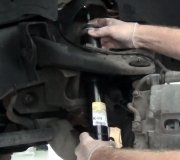Hi ForestThruTrees. Welcome to the forum. It is not necessary to use shock absorbers and struts from the same manufacturer any more than you must stay with the same brand of shoes. They can be tailored to specific characteristics of your vehicle's suspension system, and they can be designed to enhance the desired ride quality which could include smooth ride on rough roads, increased road feel, (harshness), for off-road use, and faster response to input to the steering wheel from you. That would provide "better handling" if you plan driving at high speeds on twisting and turning roads. For most people, the lowest quality shock absorbers meet their needs just fine. You can buy a $500.00 pair of shoes, but the less expensive ones will do what shoes are supposed to do quite satisfactorily.
The shock absorbers on your vehicle could have been specified by the manufacturer as part of a handling package, but other manufacturers will reproduce the same characteristics in their products. Every aftermarket manufacturer has a line of shock absorbers that are roughly equivalent to original equipment, and they have "improved" versions that cost more. "Original equivalent" are usually the least expensive replacement parts.
If you are happy with your vehicle's ride quality right now, there is no reason to replace parts due only to mileage. The two main things to look for are oil seeping from the end of the tube where the shaft extends from and if the vehicle bounces excessively. The bounce test should be performed after a long drive of a couple of hours. The constant bouncing heats up and thins the oil which reduces its ability to dampen the bouncing.
It IS possible for worn shock absorbers to cause a cupping pattern of tire wear but you will likely also notice excessive bouncing while driving. This is best diagnosed by an alignment specialist. As a specialist myself, I was NOT real familiar with the different ride quality, road noise, and handling characteristics of new tires. That was the job of the tire sales people. You may need to consult the people at a tire store for their recommendation on which tire is best for your driving preferences. They will explain the advantages of each of the tires they sell.
Some vehicles are very hard on tires. Older Ford Escorts, for example, could not possibly get more than about 15,000 miles on the front tires due to the design of the suspension system, but the cars rode real smoothly compared to other small cars. There is no such history for your vehicle. When you're shopping for tires, be sure to mention that this will be your fourth set. Even cheap tires should last 40,000 miles. They will inspect your old tires for evidence of misalignment problems, and they will inspect the steering and suspension systems for worn components that would prevent the wheels from staying in alignment.
Caradiodoc
Wednesday, May 19th, 2010 AT 3:14 AM



